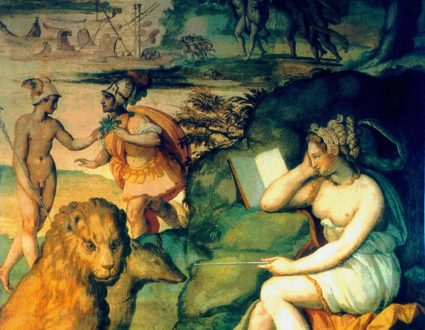
The Alvin Ailey American Dance Theater has just launched a 20-city U.S. tour under its new artistic director Alicia Graf…

Our December pick for the PBS NewsHour-New York Times book club Now Read This is "Circe" by Madeline Miller. Become a member of the book club by joining our Facebook group, or by signing up to our newsletter. Learn more about the book club here.
In Homer's "Odyssey," Circe is a minor but much-reviled goddess for having turned Odysseus' men into pigs. In Madeline Miller's retelling, Circe is a powerful but lonely immortal who finds herself by practicing witchcraft — not a divine power, but a kind of art that requires hard work, dedication and skill.
Miller believes Circe is the first witch ever chronicled in what we know as Western literature. "Our discomfort with women who wield unregulated power goes all the way back to the oldest stories we have," she writes.
Below, Miller annotates several pages of her novel that revolve around how the goddess became a witch, and what that witchcraft entails.
Read more below in Miller's annotations, which are highlighted in yellow.
By rights, I should never have come to witchcraft. Gods hate all toil, it is their nature. The closest we come is weaving or smithing, but these things are skills, and there is no drudgery to them, since all the parts that might be unpleasant are taken away with power. The wool is dyed not with stinking vats and stirring spoons, but with a snap. There is no tedious mining, the ores leap willing from the mountain. No fingers are ever chafed, no muscles strained.
Witchcraft is nothing but such drudgery. Each herb must be found in its den, harvested at its time, grubbed up from the dirt, culled and stripped, washed and prepared. It must be handled this way, then that, to find out where its power lies. Day upon patient day, you must throw out your errors and begin again. So why did I not mind? Why did none of us mind?
I cannot speak for my brothers and sister, but my answer is easy. For a hundred generations, I had walked the world drowsy and dull, idle and at my ease. I left no prints. I did no deeds. Even those who had loved me a little did not care to stay.
Then I learned that I could bend the world to my will, as a bow is bent for an arrow. I would have done that toil a thousand times to keep such power in my hands. I thought: this is how Zeus felt when he first lifted the thunderbolt.
It was one day during that time that I found myself among the thickest brakes of the forest. I loved to walk the island, from its lowest shores to its highest haunts, seeking out the hidden mosses and ferns and vines, collecting their leaves for my charms. It was late afternoon, and my basket overflowed. I stepped around a bush, and the boar was there.
I had known for some time that there were wild pigs on the island. I'd heard them squealing and crashing in the brush and often I would find some rhododendron trampled, or a stand of saplings rooted up. This was the first one that I'd seen.
He was huge, even bigger than I had imagined a boar could be. His spine rose steep and black as the ridges of Mount Cynthos, and his shoulders were slashed with the thunderbolt scars of his fights. Only the bravest heroes face such creatures, and then they are armed with spears and dogs, archers and assistants, and usually half a dozen warriors besides. I had only my digging knife and my basket and not a single spell-draught to hand.
He stamped, and the white foam dripped from his mouth. He lowered his tusks and ground his jaws. His pig-eyes said: I can break a hundred youths and send their bodies back to wailing mothers. I will tear your entrails and eat them for my lunch.
I fixed my gaze on his. "Try," I said.
For a long moment he stared at me. Then he turned and twitched off through the brush. I tell you, for all my spells, that was the first time I truly felt myself a witch.
These excerpts come from pp. 83 and 87 from the hardcover edition of "Circe."
Sustain our coverage of culture, arts and literature.